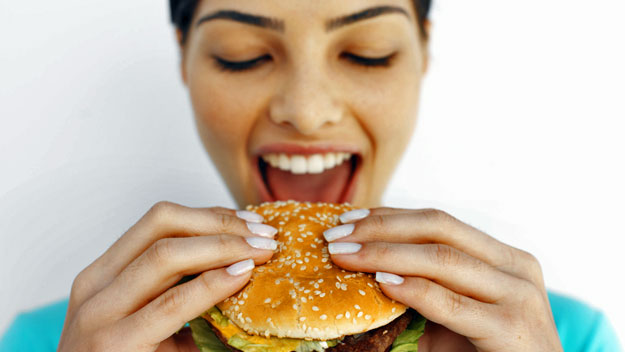The cliché of a moment on the lips meaning a lifetime on the hips has been given credence by a new Swedish study that shows that even short periods of binge eating can leave the body more susceptible to weight gain for years to come.
Previous studies have linked weight-gain to the ageing process, but this is the first to “overfeed” its subjects with junk food to monitor the long-term effects, the UK’s Daily Mail reported.
Win a health, fashion or beauty escape!
In pictures: celebs’ weight-loss journeys
In pictures: winter fashion trends
Researchers from Linkoping University took 18 slim and healthy people in their early twenties and got them to almost double their kilojoule intake for one month.
The volunteers ate junk food and did very little exercise.
A second group of similarly young and active people were told to go about their lives as normal.
At the end of the month, the first group had gained an average of 6.4kg each. Six months later they had lost most but not all of this weight.
However, the interesting results came when both groups were weighed two and a half years later. The first group were on average more than 3kg heavier than they had been at the start of the experiment, while the control group had not gained any weight.
The researchers also noted that much of the extra weight was stored on the hips.
“The change in fat mass was larger than expected. It suggests that even short-term behavioural changes may have prolonged effects on health,” Linkoping University’s Dr Asa Ernersson said.
Related video Australia’s Queen of Comedy, Magda Szubanski, has become the Queen of weight loss. She’s shed 25 kg and gained a new zest for life. Magda joins TODAY to chat about her new mission – to help motivate the nation as part of Australia’s Greatest Weight Loss Challenge
It is not yet known why these binges produced longer-term weight gain although it has been suggested that junk food actually changes a person’s physiology.
Another suggestion is that people can acquire a taste for junk food quickly because of the addictive qualities of the ingredients.
One criticism of the study, in addition to its small size, is that the kind of people who agreed to participate could have been less concerned about their bodies than average people, the Daily Mail reported.
In the most recent figures, Australia is number six in a league table of most obese people per capita, behind Greece, Slovakia, the UK, Mexico and the US.
Obesity is defined as having a Body Mass Index higher than 30.
Your say: Do you think that junk food is addictive? How easy do you find it to keep off weight once you have lost it?




